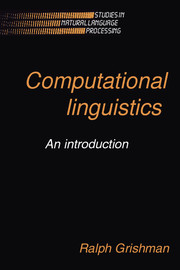Summary
The poor cousin
As we noted in the first chapter, language generation has generally taken second place to language analysis in computational linguistics research. This imbalance reflects a basic property of language, namely, that there are many ways of saying the same thing. In order for a natural language interface to be fluent, it should be able to accept most possible paraphrases of the information or commands the user wishes to transmit. On the other hand, it will suffice to generate one form of each message the system wishes to convey to the user.
As a result, many systems have combined sophisticated language analysis procedures with rudimentary generation components. Often generation involves nothing more than ‘filling in the blanks’ in a set of predefined message formats. This has been adequate for the simple messages many systems need to express: values retrieved from a data base, error messages, instructions to the user.
More sophisticated systems, however, have more complex messages to convey. People querying a data base in natural language often begin by asking about the structure or general content of the data base rather than asking for specific data values (Malhotra 1975); we would like to extend natural language data base interfaces so that they can answer such questions. For systems employing lengthy sequences of inferences, such as those for medical diagnosis (e.g., Shortliffe 1976), user acceptance and system improvement depend critically on the ability of the system to explain its reasoning.
- Type
- Chapter
- Information
- Computational LinguisticsAn Introduction, pp. 159 - 171Publisher: Cambridge University PressPrint publication year: 1986

